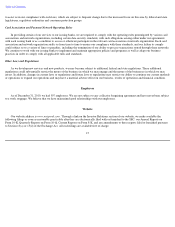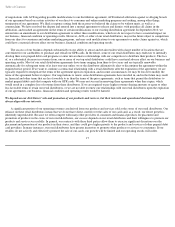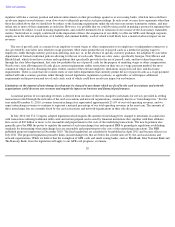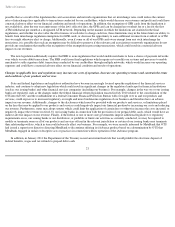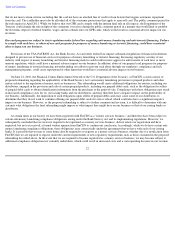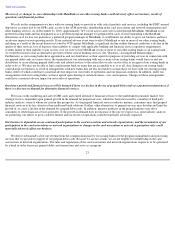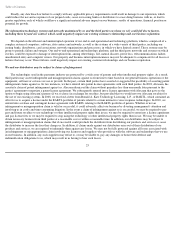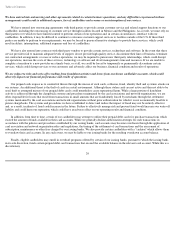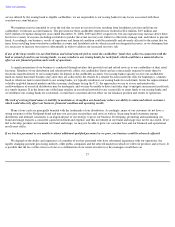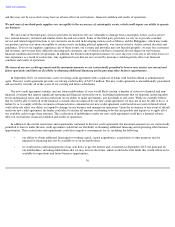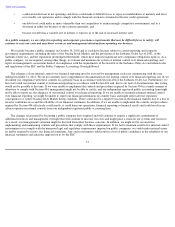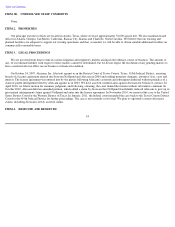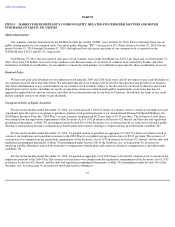NetSpend 2010 Annual Report Download - page 29
Download and view the complete annual report
Please find page 29 of the 2010 NetSpend annual report below. You can navigate through the pages in the report by either clicking on the pages listed below, or by using the keyword search tool below to find specific information within the annual report.
Table of Contents
Finally, any data breach or failure to comply with any applicable privacy requirements could result in damage to our reputation, which
could reduce the use and acceptance of our prepaid cards, cause our issuing banks or distributors to cease doing business with us, or lead to
greater regulation, each of which could have a significant material adverse impact on our business, results of operations, financial position or
potential for growth.
The information technology systems and networks maintained by us and the third parties on whom we rely could fail due to factors,
including those beyond our control, which could negatively impact our existing customer relationships and our business reputation.
We depend on the efficient and uninterrupted operation of our end-to-end operational and technology platform, which is comprised of a
complex system of computers, software, data centers and networks, as well as the systems of a wide variety of third parties, including our
issuing banks, distributors, card associations, network organizations and processors, in which we have limited control. These systems may be
prone to periodic failure and outages. Our end-to-end operational and technology platform, and the third party networks and systems on which
it relies, could be exposed to damage or interruption from, among other things, fire, natural disaster, power loss, telecommunications failure,
unauthorized entry and computer viruses. Our property and business interruption insurance may not be adequate to compensate for all losses or
failures that may occur. These failures could negatively impact our existing customer relationships and our business reputation.
We and our distributors may be subject to claims of infringement.
The technologies used in the payments industry are protected by a wide array of patents and other intellectual property rights. As a result,
third parties may assert infringement and misappropriation claims against us from time to time based on our general business operations or the
equipment, software or services we use or provide. In the past, certain third parties have asserted or suggested the possibility of asserting patent
infringement claims against us. In two instances, we have entered into patent license agreements with such third parties. In 2003, Alexsam, Inc.
asserted a claim of patent infringement against us. Alexsam dismissed the claim without prejudice less than one month later pursuant to the
parties' agreement to negotiate a patent license agreement. We subsequently entered into a license agreement with Alexsam that gave us the
option to begin using Alexsam's patents (if we so chose) in exchange for royalties, but provided that we would not owe Alexsam royalties for
the use of our existing systems. In 2008, we received a letter from Ronald A. Katz Technology Licensing, L.P., or RAKTL, which contained an
offer for us to acquire a license under the RAKTL portfolio of patents related to certain interactive voice response technologies. In 2010, we
entered into a release and contingent license agreement with RAKTL relating to the RAKTL portfolio of patents. Whether or not an
infringement or misappropriation claim is valid or successful, it could adversely affect our business by diverting management's attention and
involving us in costly and time-consuming litigation. In the event a claim of infringement against us is successful, we may be required to pay
past and future royalties to use technology or other intellectual property rights then in use, we may be required to enter into a license agreement
and pay license fees or we may be required to stop using the technology or other intellectual property rights then in use. We may be unable to
obtain necessary licenses from third parties at a reasonable cost or within a reasonable time. In addition, our distributors may be subject to
infringement or misappropriation claims that if successful could preclude the distributor from distributing our products and services or cause
the distributor to increase the fees they charge us. In addition, if claims made against our distributors arise out of their distribution of our
products and services, we are required to indemnify them against any losses. We may not be fully protected against all losses associated with
an infringement or misappropriation claim involving our licensors and suppliers who provide us with the software and technology that we use
in our business. In addition, any such suppliers may refuse to, or may be unable to, pay any damages or honor their defense and
indemnification obligations to us, which may result in us having to bear such losses.
25


